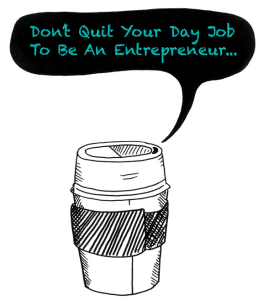Don’t Quit Your Day Job! Take The Entrepreneur Quiz

There are two main schools of thought about what makes an entrepreneur. The first is that given the right training, anyone can be an entrepreneur. The second, and the view of psychologist Adrian Atkinson, is that it takes a certain type of person to “make it” and importantly, this is not a result of genetics.
—
The theory? Entrepreneurs are not born, they are made through childhood experiences that provide them with rare attitudes and aptitudes necessary for success.
—
Dr. Adrian Atkinson, Chairman of hfi, is convinced that you cannot train someone to be an entrepreneur, yet this seems to be popular belief. Even key voices in government continue to mislead the public, referring to enterprise and entrepreneurship as though they were interchangeable.
John Denham, the Skills Secretary at the Department for Innovation, Universities and Skills approved new national skills academies for enterprise, power, IT and social care, stating, “Around 150,000 young people and adults will get the chance to develop world-class skills as entrepreneurs, IT workers, electrical engineers and social careers as four academies were given the go-ahead today.”
Dr. Adrian Atkinson says, “The media in general make this mistake and even promote the view that anyone can become an entrepreneur. What is so terrible is that this message encourages people to risk their money and incites them to create large personal debts. People come to me saying they are going to sell everything and become an entrepreneur, and I say for goodness sake don’t do it. Very few people are entrepreneurs and it is really important that people realize where their strength lies.”

Using psychometric assessments we can identify those who have the characteristics to be successful. Being an entrepreneur is only one route to success. Wealth Creators, people who make a real difference to an organization’s success, come in different types: Experts, Corporates, Enterprisers and true Entrepreneurs. The first three types are key people required in all businesses to make them successful and are more appropriate routes for many to take.
How to see if you have what it takes to be an entrepreneur
For each of the following five groups, choose one of the four statements that best describes the way you would go about starting a business of your own. Then add up the corresponding shapes to give a total.
Group 1
○ Working with other like-minded individuals
△ Making a big effort to get the company structure right
▢ Willing to work seven days a week
X Realizing that technical excellence is the key to success
Group 2
○ Getting some qualifications before starting your business
△ Only starting the business with all the finance in place
X Keeping your existing job until your business is established
▢ Seeing work as relaxation
Group 3
X Making sure you have a social life as well
▢ Be willing to sell your house and car to start your business
△ Taking your time to make all the important decisions
○ Plan your exit strategy from the beginning
Group 4
△ Not selling more than the company can deliver
X Making sure the product is perfect before getting sales
▢ Be willing to fire people who perform badly
○ Developing business plans to make strategic decisions
Group 5
△ Always involving colleagues in decisions
X Only aiming for the highest quality
▢ Be willing to sacrifice family life to build the business
○ Realizing that all that matters in business is making money
Depending on the statements you selected, if you have the appropriate personality, intellectual ability and values, then you are likely to be an Expert, Corporate, Enterpriser, or Strongly Entrepreneurial.
Mostly X: EXPERT
Not so attracted by personal risk or by commercial challenge. Sees value in getting processes right and focuses on achieving high-quality work. Prefers functional role using technical knowledge and expertise.
- • Fascinated by knowledge and skill
- • Focused on expertise and quality
- • Strives to be cutting edge
Example: James Dyson, Dyson Vacuums
Mostly △: CORPORATE
Interested in developing a business within a structured context. Achieves this by energizing groups in organizations. Willing to take business risks rather than personal risks. Looks for challenges in medium to large organizations.
- • Utilise expertise of others
- • Harness the power of the organisation
- • Builds strong executive teams
- • Has a long-term commercial view
Example: Jack Welch, General Electric
Mostly ○: ENTERPRISER
Seeks excitement from making things happen. Finds personal risk-taking exciting but prefers to share risks and rewards with others. Focuses energy on achieving goals but maintains reasonable work/leisure balance. Dislikes routine and constantly seeks challenges.
- • Takes businesses into new markets
- • Focused on business opportunities
- • Risks other peoples’ resources
- • Leads highly competent teams
- • Analytic and strategic
Example: Steve Jobs, Apple
Mostly ▢: ENTREPRENEURIAL
Enjoys starting own businesses and devotes all energy and time to make things happen, often at the expense of family, possessions and reputation. Restless and often dissatisfied with what is achieved but very resilient and able to pick up and start again. Sees work as relaxation.
- • Willing to risk everything
- • Discovers and exploits new ways of doing business
- • Little regard for resources
- • Never stops working
Example: Richard Branson, Virgin
The best way to find out if your candidates have these qualities is to assess them first – use our on-demand assessments to allow the data to make decisions for you.